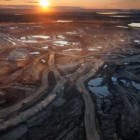Featured
NYMHM Podcast: Wind energy becalmed, new Argentine women's law, diplomas for green collars, water wars
|
By Virgil Ward Porter, KDSP-AM Sand Point (Alaska)
News You Might Have Missed, Mar. 18, 2009 (MP3)
This week’s stories:
– Argentina: New law targets violence against women
– A bridge over troubled (and scarce) water
– Diplomas for green-collar jobs
– Wind energy: Becalmed by recession
– Geo-Engineering: High hopes, climate questions


